Casablanca (1942)
Dir. Michael Curtiz
Writ. Julius J. Epstein and Philip G. Epstein, and Howard Koch, from the play by Murray Burnett and Joan Alison
w/ Humphrey Bogart, Ingrid Bergman, Paul Henreid, Claude Rains and Peter Lorre
Avoiding partisan conflicts of interest by involving himself in the Allied resistance, Rick runs and desiccates in the Cafe Americain in Casablanca, the point of no return for many wishing to escape the long arm of the Reich and its ill effects. So when old flame Ilsa walks into, "of all the gin joints in all the world," his, she brings more than the warm scents of a Paris springtime, she also brings the memory of everything that he once was and is no more.
You must remember the first time you saw a movie about a doomed love affair, and if it was Casablanca, you may have seen the best. Time and again, it lands a distinguished place on the "best ever" lists that circulate among industry people, filmmakers and critics. Among the younger, less established independent and foreign film lovers, though, a doubt festers that perhaps the film only appeared great in retrospect and that such a latent appreciation may have catapulted its status until it became an irreplaceable classic that wouldn't have been so otherwise. It raises questions, too, concerning the importance of love stories from other countries that haven't been given the same attention.
And yet, Casablanca remains an American film only quixotically. It chases ideals of freedom, the Bohemian notion that we should do as we please, especially when charged by fascists not to. An international cast, a Moroccan setting, and an elightened view of humanity peppers the film's legacy as something beyond not just the gangster films of the state-side '40s, but also beyond the scope of many war films. Practically arbitrary, the positioning of the movie in a town few Americans had ever heard of or thought about spells brilliance. Stuck between the desert on all sides and the fist of the Reich from above, what else would a card-carrying, former freedom fighter do but drink? Well, if you're Humphrey Bogart, you also own the joint so you don't pay extra to drown your sorrows in someone else's whiskey glass.
A deep idea resides just below the surface of Casablanca. In many ways, Rick and Victor are the same man, rather like the summer and autumn of a romance both stem from the same love. Life can't be all champagne, music, and drives in the French countryside, and it's interesting to note that the loner, not the altruist, facilitates the preservation of the free world. Rick goes about the business of tidying away the resistance leaders with class, too. If Victor really loved Ilsa, some have said, he would've gotten on the plane alone. But people driven by ideals don't often notice the tiny hardships their causes can produce; and, if they did, they could not go on fighting, would be in truth very different people with very different lives. More to the point, no one can ever attain perfect altruism any more than a person can claim to be wholly selfish. They have, esentially, by the end of the film swapped roles.
If for some reason the theme of redemption and love conquering all don't sweep you off your feet, consider the film's thousand tiny details: the portulent, fez-wearing owner of the Blue Parrot who lives to make deals and swat flies; the bit in which Bogie plays chess with himself while refusing to have a drink with Peter Lorre; "Yvonne, I love you, but he pays me." Claude Rains as the virile, witty sidekick to Bogart's dour, stoic platitudes also evokes timely laughs.
But perhaps the shining moment occurs when the German officers stand to sing their national anthem, and Victor and Rick order the band to play the French one in response. The Germans eventually can't overpower the armed lungs of the passionate ensemble of customers, but before they disperse, the anthems harmonize, as in rounds. And for a moment, it sounds divine.
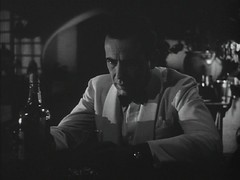

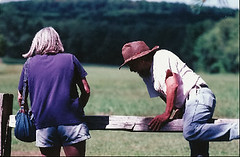
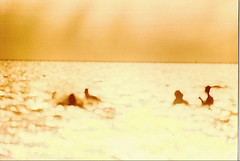
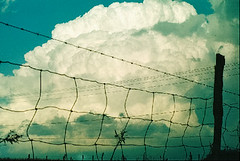
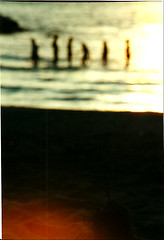
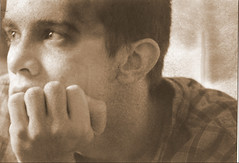
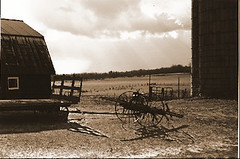
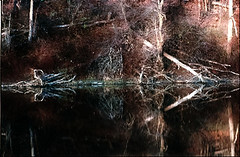






0 Comments:
Post a Comment
<< Home